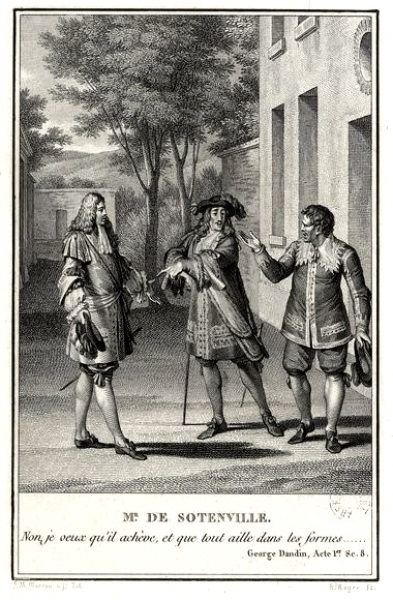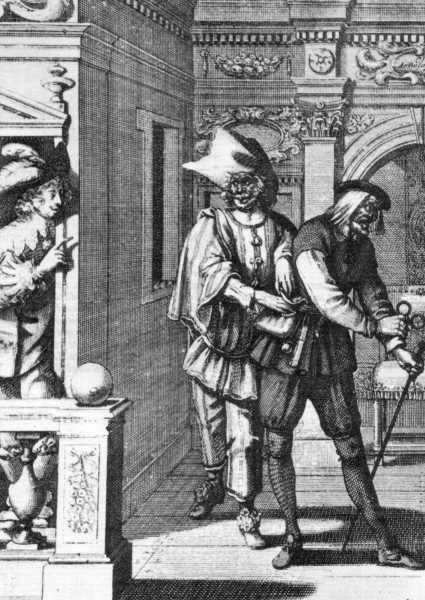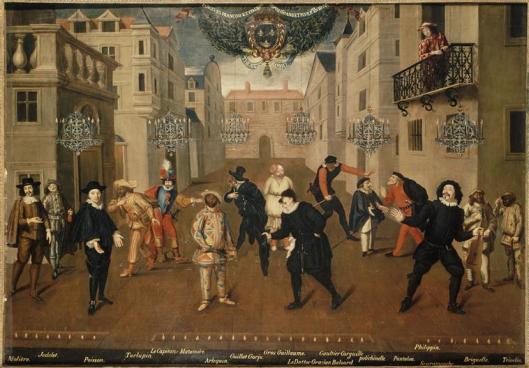Tags
Cuckoldry, farce, George Dandin, impoverished nobility, jealousy, Marriage, Molière, Sotenville, the agroikos, the right & wrong

George Dandin (Gravure Edmond Hédouin?) (documentation.théâtre.com)
(This post is very long. If you have read Molière’s “George Dandin” revisited (1), go to Act Two.)
George Dandin: a Comédie-Ballet & Pastoral
George Dandin ou le Mari confondu (George Dandin or the Abashed Husband) is a comédie-ballet combining a three-act farce and a pastoral in the form of interludes mainly. The comedy and the lyrics to the pastoral were written by Molière to music by Jean-Baptiste Lully. Contemporaries loved the music to George Dandin. It premièred at Versailles on 15 July 1668, as part of a Grand Divertissement royal celebrating the French victory at Aix-la-Chapelle. The comédie-ballet was performed three times at Saint-Germain-en-Laye from 3 to 6 November. However, when, on 9 November 1668, the three-act George Dandin was given in Paris, at the Théâtre du Palais-Royal, the pastoral had been removed.
Henri van Laun‘s six-volume translation of the plays of Molière, an Internet Archive publication, includes the text of a three-act play and the text of the pastoral. The two could be separated. The pastoral lightened an otherwise sombre farce. We are still using Henri van Laun’s translation of the three-act play and the toutmoliere.net’s collection of Molière’s plays.
In my post on the Jalousie du Barbouillé, I stated that the Jalousie du Barbouillé was a blueprint for George Dandin. George Dandin repeats the bolted door episode (Act Three)rom . In Molière, the unfortunate daughters of the nobility who were married against their will not be wives. Cuckoldry enters the picture. La Jalousie du Barbouillé does establish one of Molière central figures, le jaloux. It also introduces le cocu. If he marries, le jaloux faces cuckoldry.
Sources
Listed below, are sources Molière may have used when he wrote George Dandin:
- Guarini‘s (Il Pastor Fido) and Boccacio (The Decameron)
- the Dolopatos (the tale of a woman locked into a tower)*
- Aristophanes’ The Clouds
- the Greek agroikós: the rustic
- La Jalousie du Barbouillé
- a French fabliau
*The Dolopatos was an Indian work written before the Common Era, and translated into Arabic and Hebrew (see Salon littéraire).
However, ascertaining sources for George Dandin and other plays by Molière is difficult. We know that Molière was well educated. He was a student at the Collège de Clermont, the current Lycée Louis-le-Grand. It was the finest lycée in Paris. Molière read Roman dramatists Plautus and Terrence, and may have read Greek dramatist Aristophanes. He also studied law.
Molière’s first company, l’Illustre Théâtre, established in June 1643, went bankrupt two years later. So, in August 1645, Molière was jailed briefly, a day or so. He then left Paris and toured the provinces of France until the late 1650s. His base was Pézenas, but the répertoire of his troupe cannot be determined in an accurate manner. He didn’t write the plays members of his troupe performed. There is a story about a lost suitcase, but it seems his actors may have improvised their role, or nearly so, as did the stock characters of the Commedia dell’arte.
However, Molière also borrowed from native French farces and fabliaux. As we have seen Le Médecin malgré lui (The Doctor in spite of himself) is rooted in the Vilain Mire, a medieval French fabliau about a doctor. By the seventeenth century, the original text of the Vilain Mire may have been a mere memory, but its subject matter had entered an oral tradition to return to a written tradition. In 1656, Barbazan published the first volume of his: Fabliaux et contes des poètes français du XIIIe, XIVe et XVe siècles. Barbazan’s collection “shares several elements with Le Médecin malgré lui, and, incidentally, Georges [sic] Dandin.” (See Molière 21). The complete French fabliaux were published in 1986. (See Molière 21.) For our purposes, the closest source of George Dandin is Molière’s own Jalousie du Barbouillé.
The Dramatis Personæ are as follows:
- Georges Dandin (George Dandin), husband of Angelica
- Angelica (Angélique), Georges Dandin’s wife
- Sir Sotenville (Monsieur de Sotenville), Angelica’s father
- Mrs Sotenville (Madame de Sotenville), Sir Sotenville’s wife
- Clitander (Clitandre), in love with Angelica
- Claudine, Angelica’s servant
- Lubin, Clitandre’s servant
- Colin, Dandin’s servant
ACT ONE
As the curtain lifts, Dandin tell spectators or readers how foolish he was to marry above his rank. He is a wealthy peasant.
Ah! qu’une femme Demoiselle est une étrange affaire, et que mon mariage est une leçon bien parlante à tous les paysans qui veulent s’élever au-dessus de leur condition, et s’allier comme j’ai fait à la maison d’un gentilhomme.
George Dandin, seul (I. i, p. 1) (or p. 349)
[Ah ! what a strange thing it is to be a woman of quality and a wife! and what an instructive lesson my marriage is to all peasants who wish to raise themselves above their condition…, and to ally themselves, as I have done, to a nobleman’s family.]
George Dandin, alone (I. 5, p. 261) ( or p. 349)
Dandin more or less bought Angélique, thereby affording the Sotenvilles money that would allow them to live up to their rank.
He complains that all he has acquired is a title: “de La Dandinière,” and being related to both the Sotenville and the La Prudoterie families. To the Sotenvilles and their daughter, he remains a peasant:
L’alliance qu’ils font est petite avec nos personnes. C’est notre bien seul qu’ils épousent, et j’aurais bien mieux fait, tout riche que je suis, de m’allier en bonne et franche paysannerie[.]
Dandin, seul (I. i, p. 1)
[We ourselves count for very little in the match : they only marry our property; and I would have done much better[.]
Dandin, alone (I. 1, p. 261) (or p. 349)
Dandin realizes he has made a mistake:
George Dandin, George Dandin, vous avez fait une sottise la plus grande du monde.
[George Dandin! George Dandin! you have committed the greatest folly in the world.]
Dandin, alone (I. 1, p. 261) (or p. 349)
So, the action begins in scene two, when Dandin sees someone leaving his house. The person he sees is Lubin, Clitandre’s valet, who has delivered a message to Angélique. Not knowing who Dandin is, he tells him everything:
C’est que je viens de parler à la maîtresse du logis de la part d’un certain Monsieur qui lui fait les doux yeux, et il ne faut pas qu’on sache cela. Entendez-vous?
Lubin à Dandin (I. ii, p. 3)
[Because I have just been delivering a message to the mistress of the house from a certain gentleman who has an eye upon her; and it must not be known. Do you understand?]
Lubin to Dandin (I. 2, p. 261) or p. 350
Voilà la raison. On m’a enchargé de prendre garde que personne ne me vît, et je vous prie au moins de ne pas dire que vous m’ayez vu.
Lubin à Dandin (I. ii, p. 3)
[I have been told to take care that no one should see me; and let me beg of you, at least, not to say that you have seen me.]
Lubin to Dandin (I. 2, p. 262) or p. 351
Le mari, à ce qu’ils disent, est un jaloux qui ne veut pas qu’on fasse l’amour à sa femme, et il ferait le diable à quatre si cela venait à ses oreilles. Vous comprenez bien.
Lubin à Dandin (I. ii, p. 3 )
[The husband, from what they tell me, is dreadfully jealous, who will not allow his wife to be made love to; and there would be the devil to pay if it came to his ears. Now, do you understand?]
Lubin à Dandin (I. 2, p. 263) (or p. 351)
Dandin wishes to know whether Angélique sent a message back to Clitandre.
Elle m’a dit de lui dire… Attendez, je ne sais si je me souviendrai bien de tout cela. Qu’elle lui est tout à fait obligée de l’affection qu’il a pour elle, et qu’à cause de son mari qui est fantasque, il garde d’en rien faire paraître, et qu’il faudra songer à chercher quelque invention pour se pouvoir entretenir tous deux.
Lubin à Dandin (I. ii, p. 5)
[She has told me to tell him . . . stop; I do not know if I shall remember it all: that she is very much obliged to him for his affection towards her, and that he must be very careful not to show it, on account of her husband, who is whimsical, and that he must bethink himself to invent something, so that they may converse with each other.]
Lubin to Dandin (I. 2, p. 264) (or p. 352)
Having heard Lubin, Dandin engages in another soliloquy. It appears he will be a “cocu,” which is a breech of the marriage contract. He must tell the Sotenvilles, but his in-laws find fault with the language he uses. Madame de Sotenville does not want to be called belle-mère, mother-in-law. She belongs to the nobility:
Ne vous déferez-vous jamais avec moi de la familiarité de ce mot de ma belle-mère, et ne sauriez-vous vous accoutumer à me dire Madame.
Madame de Sotenville à Dandin (I. iv. p. 6)
[Will you never divest yourself, with me, of the familiarity of that word, mother-in-law, and can you not accustom yourself to call me Madam?]
Madame de Sotenville to Dandin (I. 4, p. 255) (or p. 354)
Monsieur de Sotenville will not allow Dandin to refer to his daughter as “ma femme” (my wife). She is Madame. He also insists on being called “Sir:”
Doucement, mon gendre. Apprenez qu’il n’est pas respectueux d’appeler les gens par leur nom, et qu’à ceux qui sont au-dessus de nous il faut dire Monsieur tout court.
Monsieur de Sotenville à Dandin (I. iv, p. 6)
[Gently, son-in-law. Let me tell you that it is not respectful to address people by their names, and that we must only say, “Sir,” to those above us.]
Monsieur de Sotenville to Dandin (I. 4, p. 254) (or p. 354)
Moreover, George Dandin is told that being related to the Sotenville and the La Prudoterie families is a privilege. Madame de Sotenville is a La Prudoterie. His title has not elevated Dandin. Having been duly humiliated, he dares tell that a gentleman is in love with Angélique.
Je vous ai dit ce qui se passe pour vous faire mes plaintes, et je vous demande raison de cette affaire-là.
Dandin aux Sotenvilles (I. iv, p. 9)
[I have told you what is going on, to justify my complaints; and I ask you for satisfaction in this matter.]
Dandin to Sotenville (I. 4, p. 258) (or p. 357)
The Sotenvilles will investigate.
Nous allons éclaircir l’affaire. Suivez-moi, mon gendre, et ne vous mettez pas en peine, vous verrez de quel bois nous nous chauffons lorsqu’on s’attaque à ceux qui nous peuvent appartenir.
Sotenville à Dandin (I. iv, p. 10)
[We are going to clear the matter up. Follow me, son-in-law, and do not trouble yourself. You shall see what we are made of, when people attack those who
may belong to us.]
Sotenville to Dandin (I. 4, p. 258) (or p. 357)
Monsieur de Sotenville speaks to Clitandre who tells him that he is being slandered.
Voilà une étrange médisance. Qui vous a dit cela, Monsieur?
Clitandre à Sotenville (I. v, p. 11)
[What strange slander is this ! Who has told you
that, Sir?]
Clitandre to Sotenville (I. 5. p. 259) (or p. 359)
Having denied he sent une ambassade to Angélique, Clitandre wants to know who told Dandin that he sent une ambassade to Angélique. It could be Angélique herself:
Est-ce donc vous, Madame, qui avez dit à votre mari que je suis amoureux de vous ?
Clitandre à Angélique (I. vi, p. 12)
[Is it you then, Madam, who have told your husband that I am in love with you?]
Clitandre to Angélique (I. 6, p. 260) (or p. 360)
She defends herself by making believe she is accusing him, but if reversed her words are an invitation to Clitandre to continue the galanterie. It’s a brilliant double entendre.
Moi, et comment lui aurais-je dit? Est-ce que cela est? Je voudrais bien le voir Je voudrais bien le voir vraiment que vous fussiez amoureux de moi. Jouez-vous-y, je vous en prie, vous trouverez à qui parler. C’est une chose que je vous conseille de faire. Ayez recours pour voir à tous les détours des amants. Essayez un peu par plaisir à m’envoyer des ambassades, à m’écrire secrètement de petits billets doux, à épier les moments que mon mari n’y sera pas, ou le temps que je sortirai pour me parler de votre amour. Vous n’avez qu’à y venir, je vous promets que vous serez reçu comme il faut.
Angélique à Clitandre (I. vi, pp. 12-13)
[I? And how could I have told him? Is it so then? I should really like to see you in love with me. Just attempt it, pray; you will find out with whom you have to deal; I advise you to try the thing! Have recourse, by way of experiment, to all the lovers’ stratagems: just attempt to send me, for the fun of it, some messages, to write me some small love letters secretly; to watch the moments of my husband’s absence, or when I am going out to tell me of your love: you have only to set about it, I promise you you shall be received as you ought.]
Angélique to Clitandre (I. 6, p. 260) (p. 360)
After speaking with Angélique, Clitandre and Angélique both deny having sent or received a message. Clitandre is a gentilhomme and Angélique, Dandin’s wife, the daughter of the Sotenvilles. They are credible, but Dandin isn’t. Despite the money he gave the impoverished Sotenvilles, all Dandin received is a hollow title and a marriage contract, he remains a peasant. He has no credibility.
Si bien donc que si je le trouvais couché avec ma femme, il en serait quitte pour se dédire?
Dandin à Sotenville (I. vi, p. 15)
[Thus, if I had found him in bed with my wife, he would get off by simply denying it?]
Dandin to Sotenville (I. 8, p. 262) (or p. 363)
I will skip the episode where Dandin has to apologize to the Sotenvilles and Clitandre. They’ve lied, but they are “personnes de qualité,”

Woman’s Head by François Boucher, c. 1750 (WikiArt.org)

George Dandin, Alexandre-Joseph Desenne (Photo credit: Internet Archive)
Act Two
In Greek literature, George Dandin, would be called an agroikós (rustic), a stock character. He is a peasant who has married into the upper classes and wishes to be separated from his wife when he realizes that he has simply bought a title: de la Dandinière. His marriage is a mésalliance. There have always been mésalliances. Some of us marry the wrong man or woman. In 17th-century France, aristocrats spent a fortune in an attempt to see Louis getting up (le lever) and going to bed (le coucher). They wanted to be ‘seen.’ Consequently, they spent a great deal of money and could not endow more than one of their daughters.
The Sotenvilles do not live in Paris, but they needed money and their best source was a rich peasant, the agroikós of Greek comedy. Dandin, our agroikós tells Angélique that she should live as wives live:
Je veux que vous y fassiez ce que fait une femme qui ne veut plaire qu’à son mari. Quoi qu’on en puisse dire, les galants n’obsèdent jamais que quand on le veut bien, il y a un certain air doucereux qui les attire ainsi que le miel fait les mouches, et les honnêtes femmes ont des manières qui les savent chasser d’abord.
Dandin à Angélique (II. i, p. 22)
[I wish you to do what a wife who only wishes to please her husband should do. Whatev[er people may say, gallants never trouble a woman unless she wishes it. There are certain sweet looks which attract them, as honey does flies; and virtuous women have a manner that drives them away immediately.]
Dandin to Angélique (II. 4, p. 269) (or p. 369)
Angélique disagrees:
Moi, les [men] chasser! et par quelle raison? Je ne me scandalise point qu’on me trouve bien faite, et cela me fait du plaisir.
Angélique à Dandin (II. ii, p. 22)
[I, drive them away! and for what reason? I am not scandalised at being thought handsome, and it affords me pleasure.]
Angélique to Dandin (II.4, p. 270) (or p. 369)
Angélique thinks her husband should be pleased to know that other men admire his wife. Dandin should play that part:
Le personnage d’un honnête homme qui est bien aise de voir sa femme
considérée.
Angélique à Dandin (II. iv, p. 23)
[The part of a sensible man, who is glad to see his wife admired.]
Angélique to Dandin (II. 4, p. 270) (or p. 369)
But the Dandins do not admire wives committing adultery. Besides, does she have obligations? She claims she doesn’t and that the Dandins will get used to her lifestyle, if they want to:
Oh les Dandins s’y accoutumeront s’ils veulent. Car pour moi je vous déclare que mon dessein n’est pas de renoncer au monde, et de m’enterrer toute vive dans un mari. Comment, parce qu’un homme s’avise de nous épouser, il faut d’abord que toutes choses soient finies pour nous, et que nous rompions tout commerce avec les vivants? C’est une chose merveilleuse que cette tyrannie de Messieurs les maris, et je les trouve bons de vouloir qu’on soit morte à tous les divertissements et qu’on ne vive que pour eux. Je me moque de cela, et ne veux point mourir si jeune.
Angélique à Dandin (II. iv, p. 23)
[I declare that I do not intend to renounce the world, and to bury myself alive with a husband. What ! because a man thinks fit to marry us, everything must be at an end immediately, and we must break off all intercourse with every living being! This tyranny of husbands is a marvellous thing; and I think it very kind of them to wish that we should be dead to all amusements; and that we should live for them only! I laugh at that, and do not wish to die so young.]
Angélique to Dandin (II. 4, p. 270) (or pp. 369-370)
Moi? je ne vous l’ai point donnée de bon cœur, et vous me l’avez arrachée. M’avez-vous avant le mariage demandé mon consentement, et si je voulais bien de vous? Vous n’avez consulté pour cela que mon père, et ma mère, ce sont eux proprement qui vous ont épousé, et c’est pourquoi vous ferez bien de vous plaindre toujours à eux des torts que l’on pourra vous faire. Pour moi, qui ne vous ai point dit de vous marier avec moi, et que vous avez prise sans consulter mes sentiments, je prétends n’être point obligée à me soumettre en esclave à vos volontés, et je veux jouir, s’il vous plaît, de quelque nombre de beaux jours que m’offre la jeunesse; prendre les douces libertés, que l’âge me permet, voir un peu le beau monde, et goûter le plaisir de m’ouïr dire des douceurs. Préparez-vous-y pour votre punition, et rendez grâces au Ciel de ce que je ne suis pas capable de quelque chose de pis.
Angélique à Dandin (II. iv, p. 23)
[I did not make them willingly, and you forced them from me. Did you, before marriage, ask me my consent, and whether I cared for you ? You consulted only my father and mother. In reality, they have married you, and therefore you will do well always to complain to them about the wrongs which you may suffer. As for me, who did not tell you to marry me, and whom you took without consulting my feelings, I do not pretend to be obliged to submit, like a slave, to your will; and, by your leave, I mean to enjoy the few happy days of my youth, to take the sweet liberties which the age allows me, to see the fashionable world a little, and to taste the pleasure of having pretty things said to me. Prepare yourself for this, for your punishment; and thank Heaven that I am not capable of something worse.]
Angélique to Dandin (II. 4, p. 270) (or p. 370)
Clitandre has been prowling around and George Dandin has seen him. He then learns from Lubin that Monsieur le Vicomte is with Angélique. George looks through the keyhole and sees Clitandre with his wife. At that very moment, kairos, the Sotenvilles arrive. Clitandre is about to leave, but he sees the Sotenvilles and Dandin. Angélique will make believe she is angry at Clitandre and will hit him with a stick. But it is her husband she hits: Dandin. The Sotenvilles are delighted to see their daughter chase Clitandre away and tell Dandin that he must be very happy.
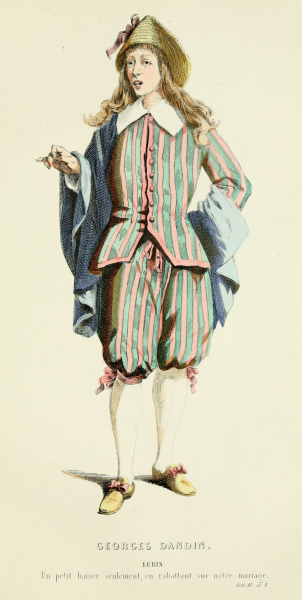
Lubin (documentation.théâtre.com)
Act Three
In Act Three, during a dark night, Lubin takes Clitandre to Dandin’s house and Claudine leads him to Angélique. Because it is dark, there is quite the chassé-croisé, a mix-up. Our lovers believe Dandin is sound asleep. He was, but he has heard his wife going down the steps and he inadvertently bumps into Lubin who thinks Dandin is Claudine and talks again. Dandin knows that the Vicomte is with Angélique. He asks Colin, his servant, to fetch the Sotenvilles and to do so as quickly as possible.
When Clitandre is about to leave Angélique, he thinks that perhaps she is a wife to Dandin.
Oui. Mais je songe qu’en me quittant, vous allez trouver un mari. Cette pensée m’assassine, et les priviléges qu’ont les maris sont des choses cruelle pour une amant qui aime bien.
Clitandre à Angélique (III. v, p. 38)
[Yes. But I cannot help remembering that, when you leave me, you go back to a husband. This thought kills me; and a husband’s privileges are cruel things to a fond lover.]
Clitandre to Angélique (III. 5, 282) (or p. 385)
Serez-vous assez fort pour avoir cette inquiétude, et pensez-vous qu’on soit
capable d’aimer de certains maris qu’il y a. On les prend, parce qu’on ne s’en peut défendre, et que l’on dépend de parents qui n’ont des yeux que pour le bien, mais on sait leur rendre justice, et l’on se moque fort de les considérer au delà de ce qu’ils méritent.
Angélique à Clitandre (III. v, p. 38)
[Are you weak enough to have such anxiety, and do you think it possible to love a certain sort of husbands? We marry them, because we cannot help ourselves, and
because we depend upon our parents, who look only riches; but we know how to be even with them, and we take good care not to value them above their deserts.]
Angélique to Clitandre (III. 5, p. 282-283) (or p. 385)
Claudine warns Angélique that she and Clitandre must part.
Madame, si vous avez à dire du mal de votre mari, dépêchez vite, car il est tard.
Claudine à Angélique (III. v, p. 38)
[Madam, if you have any harm to say of your husband, you had better make haste, for it is getting late.]
Claudine to Angélique (III. 6, p. 283) (or p. 386)
Angélique and Claudine are returning indoors, but the door is locked. This episode was rehearsed in the Jalousie du Barbouillé. Angélique pleads with Dandin, but she must feigns suicide to re-enter the house. When the Sotenvilles arrive, Angélique is free to accuse her husband of having been out drinking.
Angélique’s father asks her to forgive Dandin:
Allons, venez, ma fille, que votre mari vous demande pardon.
Sotenville à Angélique (III. vii, p. 47)
[Come hither, daughter, that your husband may ask your pardon.]
Sotenville to Angélique (III. 14, p. 290) (or p. 393)
Moi ? lui pardonner tout ce qu’il m’a dit ? Non, non, mon père, il m’est impossible de m’y résoudre, et je vous prie de me séparer d’un mari avec lequel je ne saurais plus vivre.
Angélique to Sotenville (III. vii, p. 47)
[I! pardon him after all that he has said to me? No, no, father I cannot possibly make up my mind to it; and I beg of you to separate me from a husband with whom I can no longer live.]
Angélique to Sotenville (III. 14, p. 290) (or p. 393)
Angélique wants to end the marriage and so does Dandin, but Angélique’s father will not let her leave her husband.
Ma fille, de semblables séparations ne se font point sans grand scandale, et vous devez vous montrer plus sage que lui, et patienter encore cette fois.
[Such separations, daughter, are not brought about without a great deal of scandal; and you should show yourself wiser than he, and be patient once more.] (p. 395)
Sotenville
Comment patienter après de telles indignités? Non, mon père, c’est une chose où je ne puis consentir.
[How can I be patient after such indignities? No, father, I cannot consent to it.]
Angélique
Il le faut, ma fille, et c’est moi qui vous le commande.
[You must, daughter; I command you.] (p. 395)
Sotenville
Ce mot me ferme la bouche, et vous avez sur moi une puissance absolue.
[This word stops my mouth. You have absolute authority over me.]
Angélique
What gentleness.
Claudine
FR III. vii, p. 47
EN III. 14, p. 290-291 (or p. 395)
As for Dandin, he must kneel down and apologize to his wife, repeating, word for word, as though he were a child, what Monsieur de Sotenville says.

George Dandin by François Boucher, Laurent Cars
Therefore, George says to himself that all he can do is drown himself:
Ah ! je le quitte maintenant, et je n’y vois plus de remède, lorsqu’on a comme moi épousé une méchante femme, le meilleur parti qu’on puisse prendre, c’est de s’aller jeter dans l’eau la tête la première.
Dandin (III. viii, p. 48)
[Ah! I give it up altogether, and I can see no help for it. When one has married, as I have done, a wicked wife, the best step on can take is to go and throw one’s self into the water, head foremost.]
Dandin (III. 15, p. 291) (or p. 396)
Conclusion
Angélique provides the most probable dénouement, which is the absence of a dénouement. Yet nothing is missing.
Tout ce que vous me faites faire ne servira de rien, et vous verrez que ce sera dès demain à recommencer.
Angélique à M. de Sotenville (III. vii, p. 47)
[Whatever you make me do will be of no use; we shall have to recommence to-morrow, you will see.]
Angélique to the Sotenvilles (III. 14, p. 291) (or p. 395)
If Dandin doesn’t drown, he will seek and find Angélique and Clitandre, perhaps in flagrante delicto, in the midst of it. He will run to the Sotenvilles and ask for satisfaction. There is a contract, but Angélique was never consulted. Her father probably said to her: “I command you.” Sotenville is both a pater familias and an impoverished aristocrat. All he could think of were his needs. The Sotenvilles are besotted by their rank, as we can see in Act One. As for Angélique, she was wronged, but she’s a “coquette.” However, the comedic formula used by Molière is consistent with that of farces: the deceiver deceived, except that Dandin knows he made a mistake.
J’enrage de bon cœur d’avoir tort, lorsque j’ai raison. (Dandin, I. vi, p. 15 )
[It makes me mad to be put in the wrong when I am in the right.] (I. 7. p. 262) (or p. 262)
Will Moore writes that “Dandin is essentially in the right, but he is in all actual cases made to appear in the wrong.”[2] But, according to Jules Brody, Alceste is “morally” right and “esthetically” wrong. In George Dandin, Molière remembers Le Misanthrope. Alceste is a jaloux and vain. “Je veux qu’on me distingue…” (I. i. v. 64, p. 3). “I must be singled out; to put it flatly,” (I. 1, Wikisource), but he seems “morally” right.
Love to everyone ♥
RELATED ARTICLES
- Molière’s “George Dandin” revisited (1) (29 May 2019)
- Molière’s “George Dandin” (24 June 2016)
Sources and Resources
- George Dandin is an Internet Archive publication (p. 221…) EN
- George Dandin is a Google eText FR
- George Dandin is a toutmoliere.net publication FR
- Le Misanthrope is a toutmoliere.net publication FR
- The Misanthrope is a Wikisource publication (transl. Curtis Hidden Page (EN)
- Salon littéraire
- Molière21 is a research group
_________________________
[1] There is disagreement concerning the date.
[2] See W. G. Moore, Molière: a New Criticism (Oxford: Clarendon Press, 1968 [1949]), p. 118.
[3] See Jules Brody, “Don Juan” and “Le Misanthrope,” or the Esthetics of Individualism in Molière,” PMLA, 84 (May 1969) pp. 539-76.
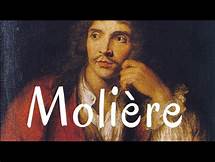
© Micheline Walker
31 May 2019
WordPress


